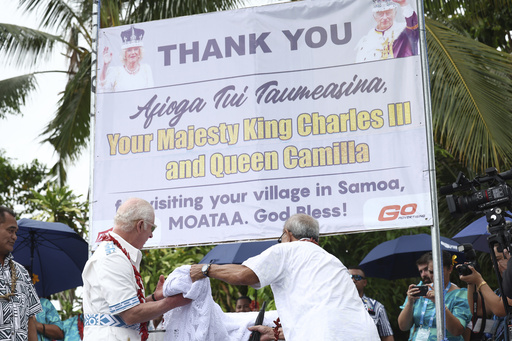
APIA, Samoa — During the Commonwealth Heads of Government Meeting that commenced on Thursday in Samoa, several Pacific island nations called on Australia to take more decisive action in phasing out fossil fuel exports.
Prime Minister Feleti Teo of Tuvalu, alongside high-ranking officials from Vanuatu and Fiji, endorsed a recent report from the Fossil Fuel Non-Proliferation Treaty Initiative. This report underscores the substantial contribution of Australia, Canada, and the U.K. to global greenhouse gas emissions.
According to the report, fossil fuel extraction from these three countries accounts for approximately 60% of emissions generated by such activities across Commonwealth nations since 1990, despite the fact that they only constitute 6% of the population within the Commonwealth.
The findings spotlight a significant disparity in fossil fuel extraction practices and highlight the inconsistency between the climate commitments made by these nations and their ongoing fossil fuel production, particularly in Australia and Canada.
Leaders from the Pacific have consistently raised alarms regarding the hazards of continued reliance on fossil fuels, emphasizing that such dependence endangers their very existence, given that many of their countries comprise low-lying islands susceptible to potential submersion due to rising sea levels.
Teo, who earlier in the year ratified a treaty with Australia designed to bolster ties related to migration, security, and climate change adaptation, has intensified his appeals for Australia to halt fossil fuel production. He cautioned that the current policies of major pollution emitters pose a “death sentence” for his country.
“I believe that Australia holds a significant moral obligation to ensure that its actions do not undermine its commitments regarding climate impact,” Teo stated during a press briefing in Apia, Samoa’s capital.
“I hope that we can use this platform to gain Australia’s support, which ideally will reflect in reduced emission levels.”
Penny Wong, Australia’s Foreign Minister, also present in Samoa, remarked that Australia is undertaking the significant challenge of transforming its economy towards net-zero emissions. However, she added that Australia should not be blamed for emissions linked to coal and gas that are exported to other nations.
Wong pointed out that most new coal-fired power plants are currently being constructed in China and other developing countries.
“While Australia must certainly work on reducing its emissions, the global community as a whole also needs to peak and reduce emissions in order to effectively address issues like rising sea levels and increasing temperatures,” she noted on Thursday.
This marks the first occasion that a Pacific Island has hosted the biennial leaders’ summit, and climate change is anticipated to feature prominently in the discussions. Over half of the Commonwealth’s member nations are small countries such as Samoa, many of which are vulnerable island states facing the dire threats posed by rising oceans.
